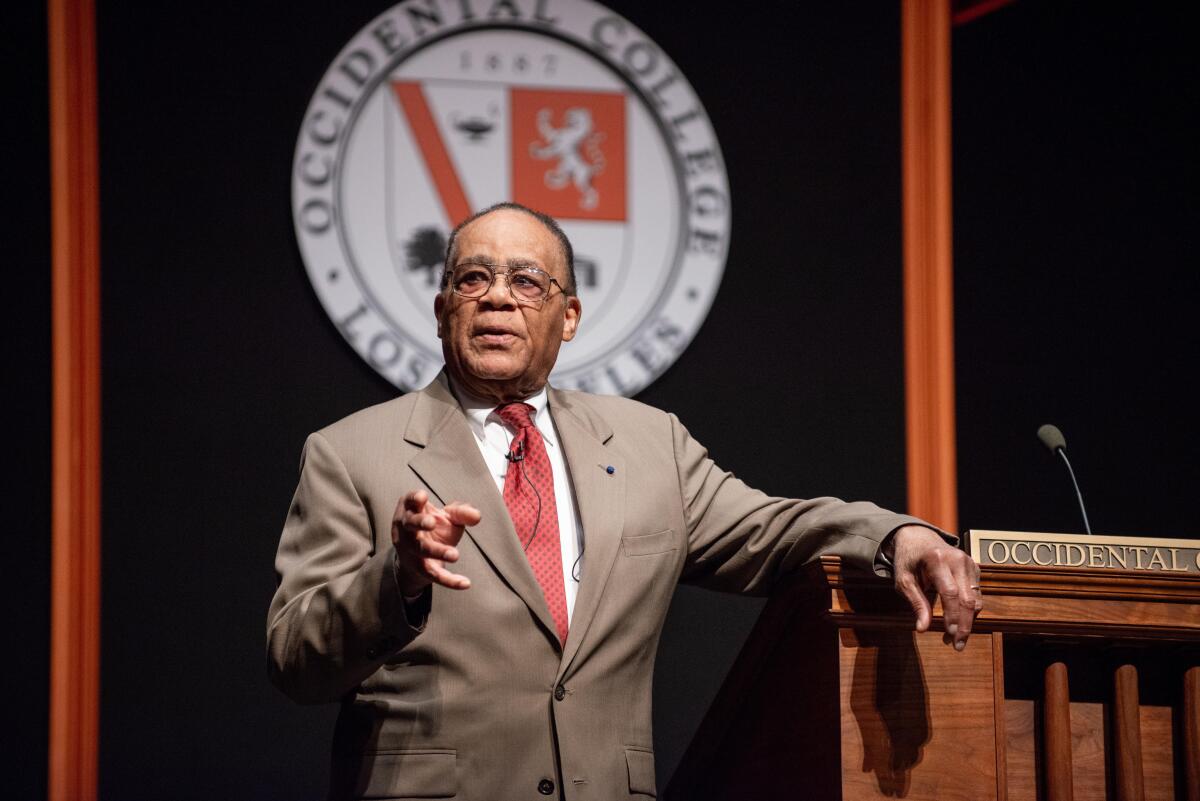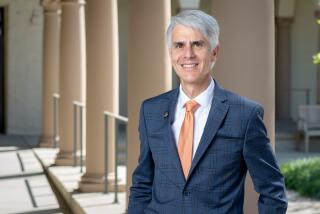John Brooks Slaughter, trailblazing engineer who led Occidental College, dies at 89

John Brooks Slaughter, a pioneering engineer who served as the first Black director of the National Science Foundation and the first Black president of Occidental College, died Wednesday at Huntington Hospital in Pasadena. He was 89.
Over the course of a trailblazing career that spanned more than six decades, Slaughter became a leading voice in both engineering and diversity initiatives, advocating for Black voices at major institutions across the country. For his efforts, he received the inaugural U.S. Black Engineer of the Year award in 1987.
“We are deeply saddened by the passing of a remarkable trailblazer, John Brooks Slaughter, the first Black Engineer of the Year. His pioneering spirit and monumental contributions have left an indelible mark on the engineering field and beyond,” U.S. Black Engineer Magazine said in a statement.
During his 11-year tenure as president of Occidental, Slaughter transformed it into one of the nation’s most diverse liberal arts schools. At his inauguration in 1989, he said, “Quality and equality are inseparable and diversity is synonymous with what is best in America.”
Under his leadership, Occidental became a premier liberal arts college with increased applications and community-building initiatives. Slaughter also oversaw a fundraising campaign that raised $72 million in five years for academic programs, scholarships and construction projects.
A year before he retired from Occidental, he told The Times that he was proudest of bringing new faces to the college.
“People have for a long time believed that if you focus on diversity and equality that you have to sacrifice quality in students and faculty,” he said. “We’ve shown that both can rise at the same time.”
The college’s flag will be flown at half-staff this week in his memory.
“The Occidental College community is deeply saddened by the passing of President Emeritus Slaughter. He is widely remembered for his positive leadership, warm personality and strong sense of integrity,” said Rod Leveque, Occidental’s vice president for marketing and communications. “He was a transformative leader whose dual commitments to excellence and equity continue to shape who we are today. Our thoughts are with his family during this difficult time.”
Slaughter was born in Topeka, Kan., and earned engineering degrees from Kansas State University, UCLA and UC San Diego. He joined the National Science Foundation in 1977 and became the director three years later, placing an emphasis on funding science programs at historically Black colleges and universities.
“I made every effort to make them realize that they could be successful in competing for grants at the NSF,” Slaughter told the Institute of Electrical and Electronics Engineers for a profile in 2023.
After butting heads with the Reagan administration, which sought to cut funding for science education, he resigned in 1982 and took the chancellor position at the University of Maryland.
In addition to his stints at the University of Maryland and Occidental, Slaughter served on numerous boards and committees, including the California Citizens Commission on Higher Education and the Los Angeles Educational Alliance for Restructuring Now.
From 2000 to 2009, he served as president of the National Action Council for Minorities in Engineering, spearheading the same diversity initiatives that he did in his previous leadership roles.
In 2010, he became a professor of education and engineering at USC, teaching courses on leadership, diversity and technological literacy. He retired from the role in 2022. A year later, USC’s Viterbi School of Engineering renamed the Center for Engineering Diversity in his honor: the John Brooks Slaughter Center for Engineering Diversity.
Slaughter is survived by his wife, Bernice Slaughter, his son, John II, and his daughter, Jacqueline.
More to Read
Sign up for Essential California
The most important California stories and recommendations in your inbox every morning.
You may occasionally receive promotional content from the Los Angeles Times.











